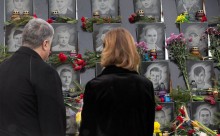On every anniversary of the massacre in the center of the capital, it is customary to talk about the Maidan lessons learned or not learned by the Ukrainian authorities. It is based on these premises that the active part of Ukrainian society determines its plans for further action. Some say that we need to complete the second Maidan, and therefore call for another uprising. Others propose to wait for the next election, and when it comes, approach the political choice more carefully, soberly evaluating the candidates. This is for some reason considered an evolutionary way of development. Although the choice between Yulia [Tymoshenko] or Vitia [Yanukovych], Petia [Poroshenko] or non-Petia has nothing to do with actual evolution, that is, the acquisition of the qualities necessary for survival in a changing environment.
Summarizing the main conclusions that Ukrainian society defines as the lessons of the Maidan, they can be one way or another reduced to two groups. The first: “We can repeat it.” That is, when the government, which is seen as criminal a priori, will cross a certain line, we will again gather in the squares. The second: “Choose not with the heart, but with the mind.” Through it, Ukrainians are constantly trying to idealize, devalue or rationalize some specific politicians that are present at the moment.
In fact, the Maidan was a historical moment when people felt the need to be the subject, not the object of the political process in the country. For all of us, the lesson of the Maidan should be the understanding that it is impossible to turn a crowd into such a subject. We have already tried that and we have not succeeded. Instead of forming groups and entering into the political process, the active part of the citizenry that understands that the country is moving in a wrong way, in a wrong direction, and towards wrong objectives – that part has been arguing about the expediency of another uprising. It should have become that politically active subject that should have emerged in the country, that quality or characteristic feature that should have formed in the collective body of Ukraine and become a preventive mechanism, an evolutionary acquisition for an integrated social organism.
What would have happened if Ukrainians had been able to elect a parliament that would have had a majority opposed to then-president in 2012? Could it be possible to solve the problem of Viktor Yanukovych’s removal from power without bloodshed then? What would have been the fate of Crimea, if the legal balance between the main ethnic groups of the peninsula had been established in advance? Could Viktor Yushchenko have succeeded in throwing out the Russian Black Sea Fleet from the Ukrainian peninsula if he had relied on the right of the indigenous people to decide on the presence of military bases in its territory?
What would have happened if a majority of society had not seen in the law the instrument of coercion and punishment from the very beginning of independence, but had sought to create a national legal field in which the law is a means of communication between the state and the citizen that is convenient and useful for all? If the business in this country had developed not on the basis of oligarchic monopolies, but on the principles of free competition and open access for a healthy private initiative of the citizens, and the Ukrainian army had been built to the NATO standards from the outset? Could Ukraine have prevented a great many soldiers betraying it in Crimea, if earlier, without waiting for an invitation to the alliance, it had sought to do more and used other approaches to military and patriotic education of soldiers? If the requirements of the Law ‘On Defense’ had been met and martial law declared in the first days of the attack on Crimea? If the General Headquarters had been created, and the task of defending the nation entrusted to soldiers, not politicians? What would have happened if the person holding the position of the head of the army had been appointed out of strategic considerations, and not to fill a political quota? Would this change something?
We will never know the answers to these questions. But worst of all, there is nobody who wants to know what we all – not politicians, but citizens – could have done differently to get a different result. In order to build institutions, we need to understand issues which we face. And to achieve that, we need a political class that understands the demands of time, has learned from its mistakes and drawn the necessary conclusions for the future. We need to want and strive for political influence. It is much more complicated, but also more effective, than being the object in other people’s political struggle.
It is time to draw conclusions. Not about “them.” About ourselves. It is time to look for like-minded people and do all we can to avoid having to go back to street protests. The main lesson of the Maidan is that it is precisely the active, civic-minded Ukrainians who need to learn its lessons.








